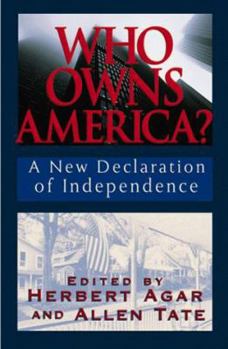Who Owns America: A New Declaration of Independence
No Synopsis Available.
Format:Hardcover
Language:English
ISBN:1882926374
ISBN13:9781882926374
Release Date:January 1999
Publisher:Intercollegiate Studies Institute
Length:450 Pages
Weight:0.20 lbs.
Dimensions:1.7" x 5.7" x 8.5"
Customer Reviews
3 ratings
Important considerations in these times
Published by Thriftbooks.com User , 15 years ago
In the late summer of 2008, many Americans were stunned to learn that their tax dollars were required to bail out large financial and insurance corporations that had become "too big to fail." With a thorough grounding in both the free market and freedom; the authors of this book spoke presciently in 1936 in terms so timeless that their words seem as though they were written last year. Who Owns America explains this phenomenon and also how it can be fixed and avoided in the future WITHOUT resorting to statist economic models such as socialism. In a series of essays written during the Great Depression, the authors lead the reader through a comprehensive re-thinking of economics, employeeism and priorities. Too often, economic ideas are presented along a continuum between socialism and capitalism; with the implicit message that options along that continuum are all that is available. For the first time for many readers, this book will open the eyes and the mind to a whole new world of very worthwhile ideas that fall outside of the artificial limitations imposed by economic labels. I recommend this book very highly to anyone who would like to REALLY understand the fundamental economic issues we are facing instead of blindly accepting the re-digested garbage from people with a current political axe to grind.
For Decentralized Politics and Private Property!
Published by Thriftbooks.com User , 19 years ago
~Who Owns America: A New Declaration of Independence~ are a group of agrarians and conservative thinkers with a sobering culture critique where they advance the case for decentralised politics and widespread distribution of private property! They extoled the need for vibrant regionalism within the the nation-state. They recognized that one must surely be an Ohioan, Texan or Virginian as they are an American. This book was published in 1936 as the Great Depression became more depressing. This is the classic sequel to I'll Take My Stand, but the contributors frame their critique in national terms rather than southern sectional terms. It is an anthology that is a selection of articles and essays from various agrarian and conservative writers, mostly from the South and Midwest. Moreover, the contributing authors essentially represented a cross-section of thinkers from southern conservatives to Midwestern agrarians. They have much common ground, but some differences as well. There major focus in the book was a critique of America's culture and increasingly centralized economic-political structure. They offered a prescriptive formula for a renewed America landscape and body politic. This was to be characterized by widespread ownership of private property, small-scale enterprises coupled with preservation of the American entrepreneurial spirit and a decentralised political system amenable to the people at the state and local level. Allen Tate's 'Notes on Liberty and Property' in my estimation is the keystone of this book. Tate's essay concentrates on the correlation between political freedom and the widespread diffusion of freehold private property amongst the citizenry. Andrew Lytle's 'The Small Farm Secures the State' is also a meaningful contribution. Donald Davidson's ideas on regionalism were rather unlikable to me given that he favors establishing regional political blocs at the expense of state sovereignty. It seems evident that making politics more decentralised would not entail annihilating state sovereignty. The shared ideal embodied in the text of this New Declaration of Independence was that Americans should be independent not only of big government but its attendant companion big business. The agrarians are not anti-capitalist per say or demagogues; but as Anglo-Catholic distributist G.K. Chesterton quipped that "the problem with capitalism is that there are not enough capitalists." The contributors together reasoned that the increasing corporate collectivism and growth of collectively-managed property is tantamount to the destruction of private property, and will inevitably yield to the attendant perils that come with socialism. The authors buoy the case that there is a strong correlation between political freedom and a widespread diffusion of political power and economic resources. They were, by and large, critical of an interventionist imperial foreign policy and tended to favor trust-busting to uproot monopolistic cartels. They offere
Highly recommended for students of politics & economics.
Published by Thriftbooks.com User , 24 years ago
Who Owns America? is a collection of informative, challenging, iconoclastic and articulate essays on the nature of industrialism, corporate capitalism, the bureaucratic state, private property, the "good" society, and neo-Jeffersonian visions of a decentralized America. From David Cushman Coyle's "The Fallacy of Mass Production", to Frank Lawrence Owsley's "The Foundations of Democracy", to James Muir Waller's "America and Foreign Trade", to Robert Penn Warren's Literature as a Symptom", to Hilaire Belloc's "The Modern Man", these and many more observant and insightful commentaries deserve as wide a readership as possible and are highly recommended to students of American politics, economics, and history.





